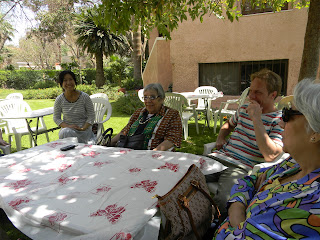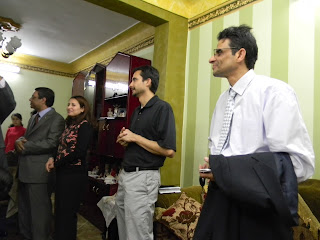In an unexpected announcement, the Nour (political) Party endorsed a new candidate this weekend for Egypt's Presidency. The surprise was not in the timing of the announcement, but in the who--Presidential candidate Aboul Fotouh.
 The populace has been awaiting an announcement for more than a week sense their previous candidate Abu Ismail (whose campaign posters comically began covering the country) was disqualified by the Presidential Election Commission. Abu Ismail has continued to lead supporters in demonstrations, but he is quickly declining in importance in the papers and in conversation. Other parties, such as the Muslim Brotherhood, quickly nominated a replacement to get back in to the race.
The populace has been awaiting an announcement for more than a week sense their previous candidate Abu Ismail (whose campaign posters comically began covering the country) was disqualified by the Presidential Election Commission. Abu Ismail has continued to lead supporters in demonstrations, but he is quickly declining in importance in the papers and in conversation. Other parties, such as the Muslim Brotherhood, quickly nominated a replacement to get back in to the race.
The Nour Party, representing the fundamental Islamists, had lost their candidate and were losing momentum. They turned to the Muslim Brotherhood and proposed a joint announcement of an Islamist candidate, so as not to split the vote. The Brotherhood rejected this Salafi proposal -- this New York Times article seems to indicate that the more moderate Muslim Brotherhood has a tendency to look down upon the Salafi.
In Aboul Fotouh, the Nour Party has found someone who also may have an "ax to grind" with the Muslim Brotherhood. Aboul Fotouh had been a leading member of the Muslim Brotherhood through the revolution last year, despite his tendency to being more liberal than his party. Aboul Fotouh was kicked out of the party when he publicly declared that he would run for the Presidency shortly after the revolution; at this point, the Muslim Brotherhood had said that they would not field a candidate, and since he separated himself, they separated from him.
When the Brotherhood decided to field a candidate, they declined to embrace Aboul Fotouh again. Instead, they picked a more conservative and charismatic leader from their own ranks, al-Shater. When al-Shater was also disqualified by the Presidential Election Commission, the press asked Brotherhood leaders if they would now endorse Aboul Fotouh--the answer was a quick and harsh "no". Instead, they fielded another leader, equally respected but less charismatic.
Meanwhile, the Presidential Election Commission's recent decisions created what a local paper said was "a two, possibly one, candidate race" -- Aboul Fotouh was one of those candidates, but he was behind the more popular Amr Mousa. But now, with the Salafi endorsement, Aboul Fotouh may have jumped in front--potentially, way in front.
One has to wonder how this partnership from the endorsement will turn out, though. The Salafis are the ultra-conservatives; Aboul Fotouh has been the picture of liberal, beyond moderate. Only time and the election will tell whether or not it can last, and how it will work out.
For now, these strange bedfellows have secured the headlines and the momentum from the Muslim Brotherhood who previously wanted nothing to do with either of them--will they also secure the election?
*Note: There are conspiracy theories. The conspiracists say that the kicking out of Aboul Fotouh was all a ploy to gain a different support base and that the Muslim Brotherhood have been orchestrating all of this all along so that one of their own ends up the President, yet maintaining distance from involvement. Yet, even with their sweeping victories in the Parliamentary elections, most are not sure the Muslim Brotherhood are that well organized or have that much foresight for such an elaborate plan.
UPDATES:
additional Salafi political group endorses Aboul Fotouh, see this article "another blow to brotherhood"
according to latest political poll of voters, Amr Mousa led candidates all candidates with 41.1% and the Muslim Brotherhood candidate, Mohamed Morsy, was last at 3.6%. Aboul Fotouh was second at 27.3%--this poll was conducted BEFORE the Nour Party endorsement. The article with poll results infers that Amr Mousa and Aboul Fotouh may win high percentages, but not necessarily a majority since there are so many candidates; in that case, a runoff election between the two would be scheduled.
 The populace has been awaiting an announcement for more than a week sense their previous candidate Abu Ismail (whose campaign posters comically began covering the country) was disqualified by the Presidential Election Commission. Abu Ismail has continued to lead supporters in demonstrations, but he is quickly declining in importance in the papers and in conversation. Other parties, such as the Muslim Brotherhood, quickly nominated a replacement to get back in to the race.
The populace has been awaiting an announcement for more than a week sense their previous candidate Abu Ismail (whose campaign posters comically began covering the country) was disqualified by the Presidential Election Commission. Abu Ismail has continued to lead supporters in demonstrations, but he is quickly declining in importance in the papers and in conversation. Other parties, such as the Muslim Brotherhood, quickly nominated a replacement to get back in to the race.The Nour Party, representing the fundamental Islamists, had lost their candidate and were losing momentum. They turned to the Muslim Brotherhood and proposed a joint announcement of an Islamist candidate, so as not to split the vote. The Brotherhood rejected this Salafi proposal -- this New York Times article seems to indicate that the more moderate Muslim Brotherhood has a tendency to look down upon the Salafi.
In Aboul Fotouh, the Nour Party has found someone who also may have an "ax to grind" with the Muslim Brotherhood. Aboul Fotouh had been a leading member of the Muslim Brotherhood through the revolution last year, despite his tendency to being more liberal than his party. Aboul Fotouh was kicked out of the party when he publicly declared that he would run for the Presidency shortly after the revolution; at this point, the Muslim Brotherhood had said that they would not field a candidate, and since he separated himself, they separated from him.
When the Brotherhood decided to field a candidate, they declined to embrace Aboul Fotouh again. Instead, they picked a more conservative and charismatic leader from their own ranks, al-Shater. When al-Shater was also disqualified by the Presidential Election Commission, the press asked Brotherhood leaders if they would now endorse Aboul Fotouh--the answer was a quick and harsh "no". Instead, they fielded another leader, equally respected but less charismatic.
Meanwhile, the Presidential Election Commission's recent decisions created what a local paper said was "a two, possibly one, candidate race" -- Aboul Fotouh was one of those candidates, but he was behind the more popular Amr Mousa. But now, with the Salafi endorsement, Aboul Fotouh may have jumped in front--potentially, way in front.
One has to wonder how this partnership from the endorsement will turn out, though. The Salafis are the ultra-conservatives; Aboul Fotouh has been the picture of liberal, beyond moderate. Only time and the election will tell whether or not it can last, and how it will work out.
For now, these strange bedfellows have secured the headlines and the momentum from the Muslim Brotherhood who previously wanted nothing to do with either of them--will they also secure the election?
*Note: There are conspiracy theories. The conspiracists say that the kicking out of Aboul Fotouh was all a ploy to gain a different support base and that the Muslim Brotherhood have been orchestrating all of this all along so that one of their own ends up the President, yet maintaining distance from involvement. Yet, even with their sweeping victories in the Parliamentary elections, most are not sure the Muslim Brotherhood are that well organized or have that much foresight for such an elaborate plan.
UPDATES:
additional Salafi political group endorses Aboul Fotouh, see this article "another blow to brotherhood"
according to latest political poll of voters, Amr Mousa led candidates all candidates with 41.1% and the Muslim Brotherhood candidate, Mohamed Morsy, was last at 3.6%. Aboul Fotouh was second at 27.3%--this poll was conducted BEFORE the Nour Party endorsement. The article with poll results infers that Amr Mousa and Aboul Fotouh may win high percentages, but not necessarily a majority since there are so many candidates; in that case, a runoff election between the two would be scheduled.


























































